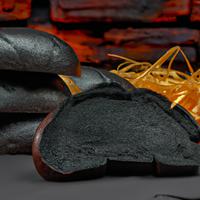
1 serving (60 grams) contains 150 calories, 5.0 grams of protein, 2.0 grams of fat, and 28.0 grams of carbohydrates.

Log this food in SnapCalorie

Nutrition Information
Calories |
600 | ||
|---|---|---|---|
% Daily Value* |
|||
| Total Fat | 8.0 g | 10% | |
| Saturated Fat | 2.0 g | 10% | |
| Polyunsaturated Fat | 0 g | ||
| Cholesterol | 0 mg | 0% | |
| Sodium | 1000.0 mg | 43% | |
| Total Carbohydrates | 112.0 g | 40% | |
| Dietary Fiber | 8.0 g | 28% | |
| Sugars | 12 g | ||
| protein | 20.0 g | 40% | |
| Vitamin D | 0 mcg | 0% | |
| Calcium | 80.0 mg | 6% | |
| Iron | 6 mg | 33% | |
| Potassium | 320.0 mg | 6% | |
* Percent Daily Values are based on a 2,000 calorie diet. Your daily values may be higher or lower depending on your calorie needs.
Food Attributes
Source of Calories
About Charcoal bread
Charcoal bread is a unique type of baked good infused with activated charcoal, typically made from coconut shells or wood. Originating from modern health and wellness trends, it has gained popularity in various cuisines for its intriguing black color and purported health benefits. The base ingredients are similar to traditional bread—flour, yeast, water, and sometimes milk—but include activated charcoal powder for its detoxifying properties. Activated charcoal is believed to help with digestion and reduce bloating by binding to toxins in the digestive system, although scientific evidence for its effects in everyday food remains limited. Nutritionally, charcoal bread is similar to regular bread, offering carbohydrates and little protein or fat. While it is generally safe, excessive consumption of activated charcoal may interfere with the absorption of certain nutrients and medications. Charcoal bread is often enjoyed as a novelty item or a trendy choice at artisan bakeries and cafes.



